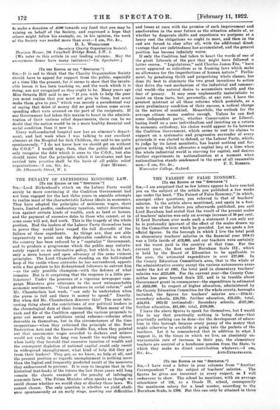THE FALSEST OF FALSE ECONOMY. [To me Enrroa or nu
" Specraroa."1 am surprised that so few letters appear to have reached you on the subject of the article you published a few weeks ago under the head, "The Falsest of False Economy," in which, amongst other questions, you referred to that of teachers' salaries. In the article above mentioned, and again in a foot- note to one of the letters you afterwards published, you said Lord Burnham had stated that the result of the present scales of teachers' salaries was only an average increase of 50 per cent. If Lord Burnham ever made such a statement I can only say he is profoundly ignorant of the effect of the scales drawn up by the Committee over which he presided. Let me quote a few official figures. In the borough in which I live the total paid in elementary teachers' salaries in the financial year 1914-15 was a little inside of £13,000, and our teachers were certainly not the worst paid in the country at that time. For the current year, the first under Burnham Scale III., which is held by the Board of Education to be applicable to the area, the estimated expenditure is over £37,000. In the County Education Committee's area, that is the whole of the administrative county except the various autonomous areas under the Act of 1902, the total paid in elementary teachers' salaries was £225,000. For the current year—the County Com- mittee has gone beyond Scale III. and is in trouble about Government grant in consequence—the expenditure is estimated at £655,000. In respect of higher education, administered by the County Education Committee for the whole county, boroughs included, the figures for teachers' salaries are :-1914-15: secondary schools, £28,789; further education, £25,225; total, £54,014. 1921-22 (estimated) : Secondary schools, £137,500; further education, £61,400; total, £198,900.
I leave the above figures to speak for themselves, but I would like to say that practically nothing is being done—that practically nothing can be done—for the development of educa- tion in this borough because every penny of the money that might otherwise be available is going into the pockets of the teachers. Let it be remembered that in addition to what suggest is, in the times in which we live, an absolutely un- warrantable rate of increase in their pay, the elementary teachers are assured of a handsome pension from the State, to which they make no direct contribution whatever.—! am,


































 Previous page
Previous page